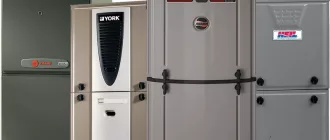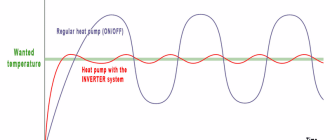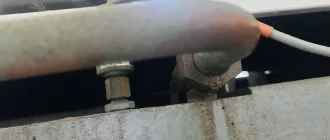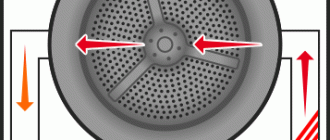
Three Ways to Figure Out if Your Heater is Energy Efficient
When it comes to keeping your home warm during the colder months, having an energy efficient heater is essential. Not only does it help to reduce your carbon footprint and save on energy costs, but it also ensures that your home stays cozy and comfortable. But how do you determine if your heater is truly energy efficient? Here are three ways to find out:
1. Look for Energy Star certification:
One of the easiest ways to determine if your heater is energy efficient is to look for the Energy Star certification label. This label signifies that the heater meets strict guidelines set by the US Environmental Protection Agency (EPA) and the US Department of Energy (DOE) for energy efficiency.
2. Check the AFUE rating:
The Annual Fuel Utilization Efficiency (AFUE) rating is another important factor to consider when determining the energy efficiency of your heater. This rating measures the heating efficiency of the unit by calculating the percentage of fuel that is converted into usable heat. The higher the AFUE rating, the more efficient the heater.
3. Consider the type of heating system:
Lastly, the type of heating system you have can also impact its energy efficiency. For example, electric heaters are typically more energy efficient than gas or oil heaters because they do not lose heat through a flue or chimney. Additionally, newer heating technologies such as heat pumps and geothermal systems are known for their high energy efficiency.
By following these three ways, you can easily determine if your heater is energy efficient. Remember, investing in an energy efficient heater not only helps the environment, but also saves you money in the long run.
How to Check if Your Heater is Energy Efficient
When it comes to heating your home, it’s important to have an energy-efficient heater. Not only does an energy-efficient heater help to reduce your utility bills, but it also helps to reduce your carbon footprint. Here are three ways to figure out if your heater is energy efficient:
1. Check the Energy Star Rating: One of the easiest ways to determine if your heater is energy efficient is to check its Energy Star rating. Energy Star is a government-backed program that certifies energy-efficient products. If your heater has an Energy Star label, it means that it meets strict guidelines for energy efficiency.
2. Look for High AFUE Rating: AFUE stands for Annual Fuel Utilization Efficiency, and it measures how efficiently a heater converts fuel into heat. To determine if your heater is energy efficient, look for a high AFUE rating. The higher the rating, the more efficient the heater is.
3. Consider the Heating System: Another way to figure out if your heater is energy efficient is to consider the type of heating system you have. Some heating systems, like geothermal heat pumps or solar heaters, are known for their energy efficiency. If you have one of these systems, chances are your heater is energy efficient.
Analyzing Energy Consumption
One of the key factors in determining if a heater is energy efficient is to analyze its energy consumption. By understanding how much energy a heater consumes, you can figure out if it is efficient or not. There are three primary ways to do this:
1. Energy Efficiency Rating: Check the heater’s energy efficiency rating. This rating is a measure of how well the heater converts energy into heat. The higher the rating, the more efficient the heater is.
2. Energy Bill Comparison: Compare your energy bills before and after using the heater. If you see a significant increase in your energy consumption, it may indicate that the heater is not energy efficient.
3. Heating Output: Consider the heating output of the heater. A heater with a high heating output can warm up a room quickly and efficiently. Look for heaters with adjustable settings and smart features that allow you to control the temperature and output.
By analyzing the energy consumption of a heater using these three methods, you can determine if it is energy efficient or not. It’s important to choose a heater that is not only efficient but also meets your heating needs.
Assessing Energy Star Rating
One of the most reliable ways to figure out if your heater is energy efficient is by assessing its Energy Star Rating. The Energy Star Rating is a standardized measurement system that allows consumers to compare the energy efficiency of different heating systems. The rating is based on a scale from 1 to 5 stars, with 5 being the most energy efficient.
There are several benefits to choosing a heater with a high Energy Star Rating. Firstly, energy efficient heaters can help lower your energy bills, as they consume less energy to heat your home. Secondly, they are more environmentally friendly, as they produce fewer greenhouse gas emissions. Lastly, energy efficient heaters tend to have a longer lifespan, which means less frequent replacements and reduced waste.
When assessing the Energy Star Rating of a heater, it’s important to consider both the heating capacity and the energy consumption. A heater with a high rating might have a lower heating capacity, which means it may take longer to heat your space. On the other hand, a heater with a low rating might have a higher heating capacity, but it will consume more energy to achieve the desired temperature.
To determine if your heater has a good Energy Star Rating, look for the Energy Star label or certification. This label indicates that the heater meets strict energy efficiency guidelines set by the Environmental Protection Agency (EPA). Additionally, you can also check the product’s specifications and compare its energy consumption to similar models. This will give you a better understanding of how efficient the heater is compared to others on the market.
In conclusion, assessing the Energy Star Rating is one of the best ways to determine if your heater is energy efficient. By choosing a heater with a high rating, you can save money, reduce your environmental impact, and enjoy the comfort of a warm home.
Comparing Heating Efficiency Metrics
When trying to figure out if your heater is energy efficient, it’s important to understand the different ways to measure efficiency. Here are three common metrics to compare:
1. Energy Efficiency Ratio (EER): This figure represents the cooling output of a heater compared to the amount of energy it consumes. The higher the EER, the more energy efficient the heater is. Look for a heater with a higher EER to save energy and reduce your heating costs.
2. Annual Fuel Utilization Efficiency (AFUE): AFUE measures the efficiency of a heater over an entire heating season. It represents the percentage of heat produced compared to the amount of fuel consumed. A higher AFUE indicates a more efficient heater, as it converts a greater amount of fuel into usable heat.
3. Seasonal Energy Efficiency Ratio (SEER): SEER is a metric used for air conditioning systems, but it can also be used to compare the efficiency of heat pumps. It measures the cooling output of a heater over a typical cooling season, divided by the amount of energy consumed. Look for a higher SEER rating to ensure energy efficiency in both cooling and heating modes.
By comparing these different metrics, you can make a more informed decision when choosing an energy-efficient heater. Consider your specific needs and budget before making a final decision. Remember, a more energy-efficient heater can save you money in the long run while also reducing your environmental impact.
Evaluating Fuel Efficiency
When it comes to evaluating fuel efficiency, there are three key ways to determine if your heater is energy efficient.
- Check the energy efficiency rating: One of the easiest ways to evaluate the fuel efficiency of your heater is to check its energy efficiency rating. This rating is typically expressed as a percentage, with higher percentages indicating higher fuel efficiency. Look for heaters with high energy efficiency ratings to ensure that you are getting the most out of your energy consumption.
- Consider the type of fuel used: The type of fuel that your heater uses can also affect its energy efficiency. Some fuels, such as natural gas and propane, are known for their high energy efficiency and cost-effectiveness. On the other hand, other fuels like oil and electric heating systems may be less energy efficient and more expensive to operate. Consider the type of fuel used by your heater when evaluating its fuel efficiency.
- Calculate the annual fuel utilization efficiency (AFUE): The AFUE is a measure of how efficiently a heater converts fuel into usable heat over the course of a year. It takes into account heat losses, standby losses, and cycling losses to provide a more accurate representation of a heater’s efficiency. Higher AFUE ratings indicate greater fuel efficiency, so be sure to calculate the AFUE of your heater to determine its energy efficiency.
By considering these three factors – energy efficiency rating, fuel type, and AFUE – you can effectively evaluate the fuel efficiency of your heater and make informed decisions to ensure that you are getting the most energy efficient heating system for your needs.
Considering Energy Efficiency Labels
When shopping for a new heater, it’s important to figure out its energy efficiency. One way to do this is by looking for energy efficiency labels.
Energy efficiency labels provide information about how much energy a heater uses and how efficiently it converts that energy into heat. These labels can help you make an informed decision when choosing a heater.
There are three main ways to understand the energy efficiency of a heater through its labels:
- Energy Star Certification: Look for the Energy Star logo on the heater’s label. Energy Star certified heaters meet strict energy efficiency guidelines set by the Environmental Protection Agency (EPA). Choosing an Energy Star certified heater ensures that it uses less energy and reduces greenhouse gas emissions.
- Energy Efficiency Ratio (EER): The EER is a measurement of how efficiently a heater converts electricity into cooling power. The higher the EER rating, the more energy efficient the heater is. Look for the EER number on the label and choose a heater with a higher rating for increased energy efficiency.
- Amp Draw: Amp draw refers to the amount of electrical current a heater requires to function. The lower the amp draw, the more energy efficient the heater is. Look for the amp draw information on the label and choose a heater with a lower amp draw to save energy.
By considering energy efficiency labels, you can make an informed decision when purchasing a new heater. Not only will you save energy and reduce your carbon footprint, but you’ll also save money on your utility bills in the long run.
Estimating Heating Costs
If you want to figure out how efficient your heater is and how much it will cost you, there are three ways to estimate your heating costs.
1. Calculate the Energy Efficiency Ratio (EER)
The first way to estimate your heating costs is to calculate the Energy Efficiency Ratio (EER) of your heater. The EER is a measure of the heater’s efficiency in converting energy to heat. The higher the EER, the more efficient the heater.
To calculate the EER:
- Divide the heating output (in British Thermal Units or BTU) by the electricity consumed (in kilowatt-hours or kWh).
- Multiply the result by 3.412 to convert BTU to kilowatt-hours.
- Divide the answer by 1000 to get the EER value.
2. Use a Fuel Cost Comparison Calculator
Another way to estimate your heating costs is to use a fuel cost comparison calculator. This type of calculator allows you to compare the cost of different fuels (such as gas, oil, and electricity) and determine which one is the most cost-effective for your heater.
You will need to provide:
- Current fuel prices
- The heating output of your heater
- The efficiency of your heater
3. Analyze Your Energy Bills
The third way to estimate your heating costs is to analyze your energy bills. Look at the amount of energy (in kilowatt-hours or therms) you have used in a given period and divide it by the number of heating degree days during that period. Heating degree days are a measure of how cold it was during that period.
To analyze your energy bills:
- Find the total energy usage for the period (in kilowatt-hours or therms).
- Find the total number of heating degree days for the period.
- Divide the energy usage by the number of heating degree days to get the average energy usage per day.
- Multiply the average energy usage per day by the number of days in the billing cycle to get an estimate of your heating costs.
By using these three methods, you can get a good estimate of how efficient your heater is and how much it will cost you to heat your home.
Understanding Annual Fuel Utilization Efficiency (AFUE)
When it comes to determining the energy efficiency of your heater, one important factor to consider is its Annual Fuel Utilization Efficiency (AFUE) rating. AFUE is a figure that represents the percentage of energy the heater converts into usable heat. Higher AFUE ratings indicate a more efficient heater, while lower ratings indicate a less efficient one.
There are three ways to find out the AFUE rating of your heater:
| 1 | Check the manufacturer’s documentation |
| 2 | Look for the yellow EnergyGuide label |
| 3 | Consult a professional HVAC technician |
By understanding the AFUE rating of your heater, you can determine how energy efficient it is and make informed decisions when it comes to heating your home.
Calculating Seasonal Energy Efficiency Ratio (SEER)
When determining the energy efficiency of your heater, one important factor to consider is the Seasonal Energy Efficiency Ratio (SEER). SEER is a measure of the cooling output of an air conditioner or heat pump, divided by the energy it consumes over a typical cooling season.
There are three main ways to figure out the SEER of a heater:
- Check the manufacturer’s documentation: The SEER rating is often provided by the manufacturer of the heater. This information can usually be found in the product specifications or owner’s manual. It is important to note that the SEER rating may vary depending on the specific model and make of the heater.
- Use an online SEER calculator: Several websites offer SEER calculators that allow you to input the necessary information about your heater, such as the cooling output and energy consumption, to determine its SEER rating. These calculators can be a convenient tool for quickly obtaining an estimate of the energy efficiency of your heater.
- Consult a professional HVAC technician: If you want a more accurate and detailed assessment of your heater’s SEER rating, it is recommended to consult with a professional HVAC technician. These experts have the knowledge and experience to evaluate your heater’s energy efficiency and provide personalized advice on improving its performance.
By using one or a combination of these methods, you can determine the SEER rating of your heater and assess its energy efficiency. This information can help you make informed decisions about your heating system and potentially save on energy costs in the long run.
Measuring Coefficient of Performance (COP)
An efficient heater is one that can produce a significant amount of heat output while consuming a minimal amount of energy. One way to determine if your heater is energy efficient is to measure its Coefficient of Performance (COP). The COP is a figure that represents the ratio of heat output to energy input.
There are three ways to measure the COP of a heater:
- Direct Measurement: This involves measuring the heat output and energy input of the heater separately and calculating the COP using the formula COP = Heat output / Energy input. This method provides an accurate and precise measurement of the heater’s efficiency.
- Manufacturer’s Specifications: Many heater manufacturers provide the COP of their products in the technical specifications. This allows consumers to compare the efficiency of different models and choose the one that best suits their needs.
- Energy Efficiency Ratings: Some organizations, such as Energy Star, provide standardized energy efficiency ratings for heaters. These ratings take into account factors such as the COP, insulation, and energy-saving features of the heater. Consumers can look for heaters with higher energy efficiency ratings to ensure they are choosing an efficient option.
By measuring the COP of your heater, you can determine its energy efficiency and make an informed decision about its performance and cost-effectiveness.
Checking British Thermal Unit (BTU) Output
One of the most important factors in determining the efficiency of a heater is its British Thermal Unit (BTU) output. The BTU rating is a figure that represents the amount of heat energy that the heater produces. The higher the BTU rating, the more heat energy the heater can provide.
There are three ways to check the BTU output of a heater to determine its efficiency:
| 1. Manufacturer’s Specifications | Check the heater’s manual or look for a label on the heater itself that provides the BTU rating. This information is usually provided by the manufacturer and can help you determine the heater’s efficiency. |
| 2. Energy Efficiency Ratings | Look for energy efficiency ratings such as Energy Star or AFUE (Annual Fuel Utilization Efficiency) to determine the heater’s efficiency. These ratings are standardized and can give you a good idea of how efficiently the heater operates. |
| 3. Professional Inspection | If you’re unsure about the BTU output or efficiency of your heater, it’s always a good idea to consult a professional heating technician. They can assess your heater’s performance and provide recommendations for improving its efficiency. |
By checking the BTU output of your heater using these three methods, you can get a better understanding of its energy efficiency and make informed decisions about its usage or potential upgrades.
Assessing the Insulation of the Heating System
When determining the energy efficiency of your heater, one important factor to consider is the insulation of the heating system. Proper insulation can greatly affect the amount of energy required to operate the heater and keep your home warm. Here are three ways to assess the insulation of your heating system:
- Inspect the ductwork: Check for any leaks or gaps in the ductwork that could be causing heat loss. Leaky ducts can lead to wasted energy and reduced efficiency. Seal any leaks or consider replacing old ductwork with new, properly insulated ducts.
- Check the insulation around the heater: Ensure that the heater itself is properly insulated. This includes checking for any gaps or cracks in the insulation material. If necessary, add insulation or replace the existing insulation to improve energy efficiency.
- Assess the insulation in the walls and ceiling: The walls and ceiling of your home also play a role in the overall insulation of your heating system. Inspect these areas for any gaps or inadequate insulation. Consider adding insulation to improve energy efficiency and reduce heat loss.
By assessing the insulation of your heating system, you can determine if it is energy efficient or if improvements need to be made. Taking the time to evaluate and improve the insulation will not only save you money on energy costs, but also help reduce your carbon footprint.
Monitoring On/Off Cycles
One of the effective ways to figure out if your heater is efficient in terms of energy usage is by monitoring the on/off cycles. By observing how frequently your heater turns on and off, you can determine if it is operating optimally or if there are any potential issues.
When a heater frequently turns on and off, known as short cycling, it may indicate that the heater is not efficiently maintaining the desired temperature. This can be caused by issues such as improper sizing, faulty thermostat, or problems with the heating system itself. Short cycling not only wastes energy but can also put unnecessary strain on the heater, leading to a shorter lifespan.
On the other hand, if your heater hardly turns on or has long periods of continuous operation, it might be an indication that the heater is oversized for your space. This means that it is producing more heat than necessary, resulting in energy waste and uncomfortable temperature fluctuations. Oversized heaters are not energy-efficient and can lead to higher energy bills.
Therefore, monitoring the on/off cycles of your heater can help you determine if it is operating efficiently or if it needs servicing or adjustments. If you notice any irregular patterns or excessive cycling, it is recommended to consult a professional technician to evaluate and address any potential issues.
Conducting a Professional Energy Audit
When trying to figure out if your heater is energy efficient, one of the most effective ways is to conduct a professional energy audit. A professional energy audit is conducted by certified experts who will assess the energy consumption of your heater and provide recommendations for improving its efficiency. Here are three ways a professional energy audit can help you determine if your heater is energy efficient:
- Thorough inspection: During a professional energy audit, the experts will thoroughly inspect your heater, including its insulation, duct system, and overall performance. This inspection will help identify any areas where energy may be wasted and highlight areas that need improvement.
- Measurement and analysis: The professionals will use specialized tools to measure the energy consumption of your heater and analyze the data. This will allow them to calculate the heater’s energy efficiency rating and compare it to industry standards. By analyzing the data, they can pinpoint any potential issues or inefficiencies.
- Recommendations and solutions: After completing the audit, the experts will provide you with a detailed report outlining their findings and recommendations. They may suggest insulation upgrades, duct sealing, or other energy-saving solutions to improve your heater’s efficiency. These recommendations will help you make informed decisions on how to reduce your energy consumption and save on heating costs.
Overall, conducting a professional energy audit is an effective way to determine if your heater is energy efficient. It provides a comprehensive assessment of your heater’s performance and offers insights into potential energy-saving measures. By taking advantage of the expertise of certified professionals, you can ensure that your heater operates at its highest energy efficiency, helping you save on energy costs and reduce your carbon footprint.
Q&A:
How can I determine if my heater is energy efficient?
There are three ways to determine if your heater is energy efficient. First, you can check the Energy Star label on the heater. Second, you can calculate the energy efficiency ratio (EER) of the heater. Third, you can look for a heater with a programmable thermostat.
What does the Energy Star label on a heater mean?
The Energy Star label on a heater means that it meets certain criteria for energy efficiency set by the Environmental Protection Agency. Heaters with this label are designed to use less energy and save you money on your heating bills.
How do I calculate the energy efficiency ratio (EER) of my heater?
To calculate the energy efficiency ratio (EER) of your heater, you need to divide the cooling capacity by the power input. The higher the EER, the more energy efficient the heater is. You can usually find the necessary information in the heater’s specifications or user manual.
Why is a programmable thermostat important for energy efficiency?
A programmable thermostat is important for energy efficiency because it allows you to set different temperatures for different times of the day. This means you can reduce the temperature when you’re away from home or sleeping, which helps save energy and reduce your heating costs.
What are some other ways to improve the energy efficiency of my heater?
In addition to checking the Energy Star label, calculating the energy efficiency ratio, and using a programmable thermostat, there are other ways to improve the energy efficiency of your heater. You can ensure that your home is properly insulated, seal any air leaks, and keep your heater well-maintained with regular cleaning and service.
What are the benefits of having an energy-efficient heater?
Having an energy-efficient heater can help save on energy costs, reduce carbon emissions, and provide a more comfortable living or working environment.
How can I determine if my heater is energy efficient?
There are several ways to determine if your heater is energy efficient. You can check its energy rating, look for the Energy Star certification, or measure its AFUE (Annual Fuel Utilization Efficiency) rating.






